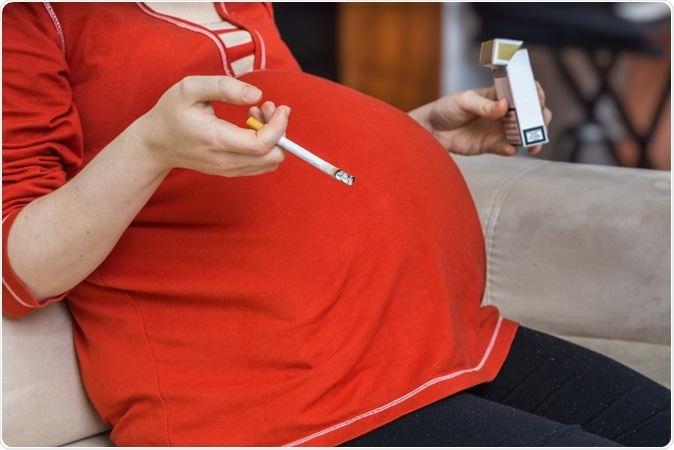According to a new study published this week in the journal Pediatrics, quite a few breast feeding women are not abstaining from alcohol and are thus causing exposure of their babies to alcohol. They write in their study that children who are exposed to alcohol in the breast milk that they take are likely to have lower cognitive abilities.

Drinking or smoking while breastfeeding and affects later cognition in children. Image Credit: By vchal / Shutterstock
According to a team of researchers from the Macquarie University in Australia, “This is the first study in which associations between alcohol exposure through breast milk and cognition in children are examined.”
For this study the team of researchers looked at 5,107 Australian infants recruited since 2004. These children were evaluated once in two years till they were of the age 11 years. The mothers of these children were provided with a modified questionnaire devised by the World Health Organization asking them about their alcohol consumption and cigarette smoking during their pregnancy and breast feeding months. The children, on each of the visits, were checked on for their nonverbal reasoning, vocabulary and cognitive abilities.
Results showed that children of mothers who had higher consumption of alcohol during pregnancy and breastfeeding had lower nonverbal reasoning scores. These low performing children were mainly 6 to 7 year olds who had been breastfed. This was not seen among children of mothers who consumed alcohol but had not breastfed. Other factors that could have contributed to the lower nonverbal reasoning power among these children included alcohol consumption during pregnancy, sex of the child, age of the mother at pregnancy, birth weight and duration of breast feeding. The low cognitive abilities however evened out by the time the children were 10 or 11 years of age, the researchers noted. Experts say that this could be because of the environmental factors that determined cognitive abilities as the child grew up. As the education levels rose, the effects of alcohol exposure during prenatal and breast feeding months declined said the researchers. The clinical effects of alcohol consumption in the mother on the children were not significant unless the mother drank too much, they noted.
The study also noted that maternal smoking during breastfeeding and pregnancy did not have a significant effect on the child’s cognitive abilities. They compared women smoking 1.06 cigarettes a day with those smoking 2.84 cigarettes a day. Authors as well as experts are quick to point out that women should not take this a green light to go ahead and smoke during pregnancy and breast feeding. They explain that cigarette smoking may not affect the cognitive abilities in the child but have the potential to cause harm to several other organs and organ systems. These toxins may remain on the mother’s body and clothes and the baby might be exposed to them say the researchers.
Another finding that came out of the study results was that 91.7 percent of the children had been breast fed at some point of their infancy and only 8.2 percent had never been breast fed. Breastfeeding rates in Australia are higher than those in the United States say the experts and alcohol use is also different. While only one in ten American woman drinks during her pregnancy, at least 40 to 80 percent of women from Australia, New Zealand and United Kingdom drink during their pregnancy. This can cause harm to the baby state experts.
According to the Centre for Disease Control and Prevention (CDC) drinking alcohol is not recommended among pregnant mothers. However moderate alcohol consumption up to one drink per day is not known to be harmful for the infant provided at least a two hour gap between the drink and nursing the baby is provided. Alcohol content in breast milk peaks half an hour to an hour after the drink and stays in the milk for at least two to three hours. Many mothers tend to pump and discard the milk after a drink thinking that it gets rid of the alcohol in the milk. The CDC says that it does not rid the milk of alcohol and traces of alcohol can be found in the milk for hours.
A commentary was published along with the study in the same issue. It was written by Dr. Lauren M. Jansson, director of pediatrics at the Center for Addiction and Pregnancy and an associate professor of pediatrics at the Johns Hopkins University School of Medicine. She writes, “Previous recommendations that reveal limited alcohol consumption to be compatible with breastfeeding during critical periods of development, such as the first months of life, may need to be reconsidered in light of this combined evidence.” She said other substance abuse among pregnant and breast feeding mothers such as use of marijuana also needs to be studied in details. She said that this study is important because it shows the “complex neurobiological and developmental vulnerability of the substance-exposed child.”